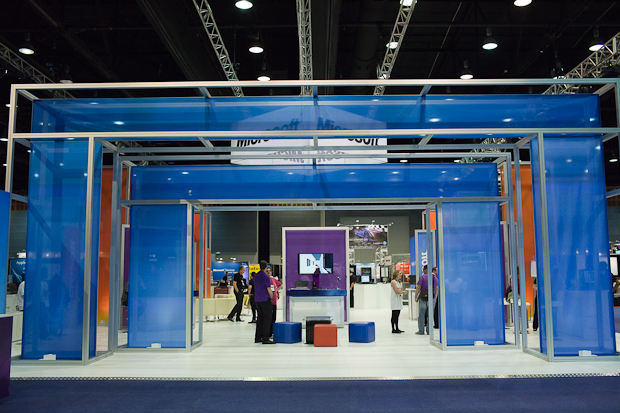Tech.Ed reimburses attendees, upgrades kit

Microsoft has brought on more of Hewlett-Packard's equipment kit to support the increased demand on its Storage Area Network (SAN) at Tech.Ed this week, and begun to compensate attendees that have been affected.

The Microsoft stand at Tech.Ed.
(Credit: Michael Lee/ZDNet Australia)
Earlier in the week, disruptions to Tech.Ed's SAN meant that attendees that had paid an additional $715 to attend the pre-conference technical training labs were in some cases unable to complete any of their learning plans.
However, yesterday evening, Microsoft IT pro Jeff Alexander was able to confirm that its hardware sponsor, Hewlett-Packard, would be bringing in additional hardware to address demand issues that were causing issues with the SAN.
"More people attended than we expected, and the design wasn't just right for the amount of people that were hitting it," he said.
As for attendees that had missed their labs due to the issue, Microsoft said in a statement that it would be putting measures in place, such as extending opening times for the now functional labs or adding extra sessions, and helping attendees out on a case-by-case basis. Attendees affected were encouraged to contact event organisers through the @auteched twitter account or visit the Microsoft HelpDesk.
CommsIT Australia chief operating officer Hayden McManus, who wrote a series of posts on the Au Tech Heads blog describing his experiences, was able to confirm with ZDNet Australia that after talks with Microsoft technical audience lead Sarah Vaughan and Alexander, he and several others had received a full refund of the pre-conference fees.
"Taking the extra time off and having to shell out the extra money to get up here to do this and then to not have it go through was a fairly negative thing, but, to their credit, Microsoft handled it extremely well," he said. "There's always going to be demos that don't run quite run right, or some labs that might have some performance issues, but I think that's the real world. It probably would be a good thing, though, that if people are paying a premium dollars to get a premium service. I think that's why Microsoft have done what they've done here, and have given the money back," he said.
McManus said that Microsoft staff had also been very transparent throughout the process.
"By mid afternoon on the first day, [Microsoft] had staffers coming around and briefing us about what was going on, and we were told there was a disk queue length issue on the SAN," he said.
"By the time we came in the next day [Tuesday], there were some bleary-eyed network engineers standing in the corner again. They'd obviously spent all night re-imaging all of the labs, and they'd changed it so that most of the virtual machines ran on the workstation rather than off the SAN."
Despite the hiccups, the rest of the Tech.Ed network appears to have performed well. Over 900 wireless users were connected wireless to the network during the Tech.Ed keynote alone, and ping times to the Brisbane Telstra exchange during this time were still about 1ms.
Wireless has been a significant concern this year for Microsoft, which works with Codify to build the Tech.Ed network.
"If you look around at all the guys running around, most people are running around with one or two devices. We always have to look at the scalability side of things. We've got to avoid the deadspots, and too many people getting on the one router. We've alleviated that with overlapping and things like that on the network," said Alexander.
The network has over 77 switches and over 2000 ports of connectivity, as evidenced by the huge number of spaces where attendees can plug in to the network over Ethernet. These wired connections provide attendees with a 100Mbps connection to the internet, which routes through a 1Gbps fibre connection direct from the convention centre to Telstra's Brisbane exchange.
A 500Mbps redundant connection is also in place with Over The Wire, should problems arise with the Telstra fibre connection, which was installed three years ago.
Although there is potential for that amount of bandwidth to be abused, Alexander said that the Tech.Ed attendees are good citizens on the network, and appear to appreciate what they're getting. For the few that abuse the network, Alexander said that the networking tools available to them allow them to ban the MAC addresses of attendees' devices. So far, he hasn't come across users spoofing their MAC addresses to circumvent these network bans.
Michael Lee travelled to Tech.Ed as a guest of Microsoft Australia.